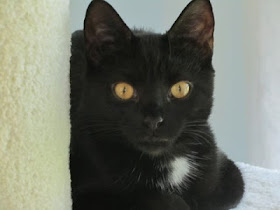TRAINING A KITTEN
Some people claim cats are not trainable. They claim that cats are independent with wills of their own and humans can't understand them. Cat owners who love and know their cats say "hogwash" to that! Training cats requires patience, just like training other animals. Learning their behaviors takes time, observation and a willingness to listen to their unspoken signals as well as their vocal ones.
The first kitty behavior we wanted to change with Zoie was biting and scratching, even in play. One of the most common actions a human does with a kitten is to offer their hand in play. Not a good idea if you don't want your kitten to scratch and bite. Kittens are teething and want to chew. They like grabbing their litter mates and scratching and tumbling with them. When you adopt a young kitten, you'll either be a momma substitute or a sibling substitute...or both.
I could tell Zoie had been weaned from her mom because she easily ate solid food. She also did not do a lot of suckling on blankets or towels...or even a lot of kneading. But she did like to grab on, gnaw and scratch. So the first thing we did was immediately give her a toy to do that with whenever she started. The main element of good training is consistency. This means every time she does it, I had to substitute a toy. Not just sometimes. Not just when I felt like it. So I kept a couple of small stuffed toys handy in the places she liked to hang out most.
ZOIE AND HER FAVORITE CAT TOY
Sometimes when her stuffed bear or cat weren't handy, I had to separate from her with a firm "no" or give her a time out. I would put her on a chair and leave the room. The important fact to remember is to not engage when the behavior is one you don't want to continue.
By observing the times Zoie most often hung on to scratch and bite, I realized those times occurred more often when she was getting sleepy. She still wrestles and chews on her bear and cat before she goes to sleep. At over five months, she's doing it less. But she hasn't given up those two toys yet. (Make sure the toys don't have plastic noses or eyes that will crack or break because kitties can really bite!)
Now when we play with Zoie, she doesn't bite us and her claws are in. Most of the time. Once in a while she forgets and then I give her her toy. But time outs for that are rare now.
"No is a word a kitten can learn, but use it effectively and in a certain tone of voice. Moms know what I mean. It doesn't have to be loud or scary but it does have to be resolute and firm. Zoie started to jump up my jeans to get my attention. London did that when she was a kitten and she wouldn't take "no" for an answer. So I got some of those sticky strips that you're supposed to put on furniture so cats don't scratch. (London used to peel those right off the sofa!) On my slacks' legs, however, they stopped her and we broke the habit. With Zoie, all it took was a sharp "no." Now she might playfully jump up at me if she's hungry or just wanting to be playful.. But it's not a "claw up my legs" jump...more like a teasing "remember I'm here" jump.
ZOIE AND LONDON COMPETE FOR RIGHTS TO THE SCRATCHING POST
Next
week--Zoie's relationship with Ebbie, flower essences, water spray
bottles and what we're still trying to teach a kitten with hunter
instincts who's growing up fast!
©2012 Karen Rose Smith
Karen Rose Smith's romance website
Karen Rose Smith's mystery website
IN TOUCH WITH KAREN ROSE SMITH e-zine
Karen Rose Smith's romance website
Karen Rose Smith's mystery website
IN TOUCH WITH KAREN ROSE SMITH e-zine




Great blog. It's so true. Cats are trainable. One of the first words my cats learned when moving in with me was 'no'. I astounded company once when my cat was acting out, I told my girl 'no', she immediately obeyed. And my neighbour looked at me as if I'd just performed a miracle. No miracle. Simple consistency did the 'trick'.
ReplyDeleteCan't wait to read more of your kitty cat adventures.
Jacqueline--Zoie actually sits down sometimes when I say. "No" in that tone of voice. But it's hard to be constantly consistent. Thanks for commenting.
ReplyDelete